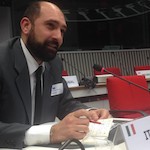
How to further engage European citizens to improve the health system and make it more resilient and efficient
The WHO has defined community engagement as “a process of developing relationships that enable stakeholders to work together to address health related issues and promote well being to achieve positive health impact and outcomes”1 , and it underlines the “Community and civil society engagement” as a pillar of its “Global Action Plan for Healthy Lives and Well-being for All”2. Twenty years ago, in the process of defining the European Charter of Patients’ Rights – drafted by Active Citizenship Network together with organizations from 15 EU countries –, the right to participate in policymaking in the area of health3 was emphasized as a right of active citizenship. More generally, across the world, it is strongly believed that there is a clear added value in strengthening cooperation among all relevant public and private actors at local, national & European level, including health authorities, healthcare professional, the Scientific Society & Academia, the industry, research and innovation centers, providers, and the media.
For Active Citizenship Network, the EU branch of the Italian NGO Cittadinanzattiva, a civil society organization that works to reduce inequalities, protect patients’ rights and promote civic participation in the policy-making process at all levels, there are three major pre-conditions that need to be underlined when considering citizens’ involvement for improving the health system:
a long term strategy instead of a spot initiative; an approach of “General Interest”, because it is only by protecting the general interest that particular interests are also safeguarded; and the need to guarantee a leading role to the people, the communities, intermediate bodies such as Patients’ Advocacy groups (PAGs), citizens organizations involved in healthcare issues and, more generally, all actors that promote health as a common good.
This is crucial now more than ever, in order to better address the consequences of the Covid-19 outbreak. Consequently, we have decided to devote the 15th European Patients’ Rights Day4 (planned 5 & 6 May 2021)5 to show and discuss good examples of citizens’ engagement in health policies in this particular historical moment. The above-mentioned statements contradict the unfortunate reality that there is no record of citizens’ involvement in the “Proposal for a regulation of the European Parliament and of the Council on serious cross-border threats to health and repealing Decision No 1082/2013/EU”6.
In this regard, Cittadinanzattiva/Active Citizenship Network welcomes the European Commission’s proposal for a stronger and more comprehensive legal framework to react rapidly and trigger the implementation of preparedness and response measures to cross-border threats to health across the EU. However, the proposal reveals a serious gap which proves as completely unjustified in light of the lessons that we should have learnt from the pandemic: in the document there is no reference to the role and involvement of actors of the civil society and Patient Advocacy Groups (PAGs) that could be engaged in the management of serious cross-border threats to health, in support of the institutions, and for the benefit of local communities.
An action managed by the EU Commission, such as the one described in the Proposal for Regulations of the European Parliament and of the Council on serious cross-border threats to health, in compliance with the path indicated by the President of the European Commission towards building the European Health Union, cannot fail to directly address the European population as well.
The European institutions must feel the need of “ferrying” European citizens towards this necessary awareness (i.e., in terms of global health and its main threats, a “one health approach”, etc.), which is fundamental to build the European Health Union, announced by President von der Leyen in her State of the Union address on 11 November 2020. PAGs and civic society organizations play an important role in bringing out the needs of particular populations and specific categories of patients, who must therefore be recipients of priority attention, as well as receive timely information from competent health authorities.
Authorities that should benefit from the aforementioned associations to disseminate specific information necessary to ensure, for example, the essential continuity of care for patients in need.
Because of the COVID-19 pandemic, 20 years of progress in terms of prevention were put at risk when screening and vaccination services were delayed or suspended during the pandemic, with inevitable consequences on the health of many individuals.
To limit these “indirect” effects of the pandemic, it is crucial to make up for the time lost in terms of prevention as soon as possible, which requires a strong investment also in information & citizens’ empowerment, an essential element of any long-term strategy to make the health system more resilient and efficient.
_______________________________________________________________________________
1 WHO: “WHO community engagement framework for quality, people-centred and resilient health services”, https://apps.who.int/iris/bitstream/ handle/10665/259280/WHO-HIS-SDS-2017.15-eng. pdf.
2 WHO: “Stronger Collaboration, Better Health: The Global Action Plan for Healthy Lives and Well-being for All”, www.who.int/initiatives/ sdg3-global-action-plan.
3 Active Citizenship Network: “European Charter of Patients’ Rights”: www.activecitizenship.net/files/ patients_rights/charter-of-rights/sites-which-hostthe-charter/EUROPEAN_COMMISSION.pdf.
4 Active Citizenship Network: “European Patients’ Rights Day 2021“: www.activecitizenship.net/ patients-rights/projects/382-european-patientsrights-day-2021.html.
5 To join the conference titled “The role of civic society and Patients Advocacy Groups for more resilient Health Care Systems. Lessons learned toward a European Health Union), please register here: https://zoom.us/webinar/register/ WN_DS86m3cqSkGmTZOoa9EgiA.
6 EU Commission: “Serious cross-border health threats – stronger, more comprehensive rules”: https://ec.europa.eu/info/law/better-regulation/ have-your-say/initiatives/12795-Seriouscross-border-health-threats-stronger-morecomprehensive-rules.




